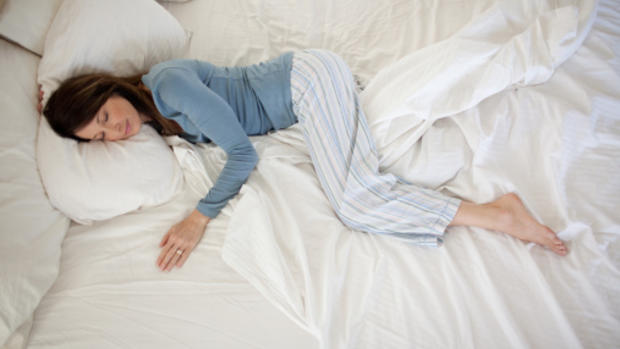Debi Mazar: Sleep tips from a Hollywood workaholic
Even by Hollywood standards, Debi Mazar's life is unconventional and over-scheduled. Between shooting scenes for the upcoming "Entourage" movie and her new TV Land series "Younger," cooking up Italian feasts with her husband on her Cooking Channel series "Extra Virgin," and her real-life parenting responsibilities, sleep often takes last priority.
Mazar may be a celebrity but she's also still human, and the 50-year-old recently started focusing on some of the issues that may be contributing to her constant sleep deprivation.
"I've been functioning on four or five hours, which is a very common thing for workaholics," Mazar told CBS News. "I get up and want to go and I also want to exercise, and I find myself midday, like, whoa -- the crash. And it's really hard for me, especially being an actor. I have to memorize dialogue. I have to also remember everything my children said because they'll throw it back in my face and say 'mommy, I told you.' And I have a husband who is like me too, also an A-type personality. So I really need to be on point and four or five hours [sleep] is not cutting it for me."
Mazar is like millions of other Americans struggling to get by on not enough sleep. According to the National Sleep Foundation, 43 percent of Americans between the ages of 13 and 64 say they rarely or never get a good night's sleep on weeknights. Mazar is also among some 60 percent of Americans who report a chronic sleep-related problem like insomnia.
It's not just busy schedules that keep Americans up too late -- it's also lifestyle habits. From consuming too much sugar, alcohol and caffeine to insufficient exercise and spending too much time at night staring at our laptop, tablet and mobile phone screens, many of us are unconsciously sabotaging our changes of getting a good night's sleep.
"The truth of the matter is in the American culture we really don't take the time to take a siesta -- a nap -- we just keep on going," said Mazar.
It doesn't help Mazar that her schedule is erratic at best. Sometimes she works late into the night or has to wake up before dawn for a shoot. Traveling frequently across many time zones doesn't help. She says the problem isn't that she has trouble falling asleep, it's that she wakes up too soon or too early -- a common version of insomnia, a problem that's especially likely to plague women and older adults.
"I have children, I have a very needy dog, I have a schedule that fluctuates," she said. "I'm traveling, I'm flying. At my home in Italy, we have a rooster named Etorre and he wakes me up, and then I have wild boars and then they start snorting around my window. And they're magical and fascinating, and they weigh like 600 pounds. I want to look out my window and see. They're like the wildebeests... I'm always amazed by nature or what's going on in the neighborhood -- I hear sirens in Brooklyn. I'm just a person who is a curious and my brain is always on."
Mazar has had to adjust habits in her waking life to reduce interfering with her shuteye.
"A lot of my thing is learning how to diet right, exercise, cut back on my caffeine, not have wine late or alcohol, because alcohol turns into sugar; caffeine keeps you awake, chocolate keeps you awake, desserts keep you awake," she said. "For me, most of it was diet and exercise and then I've tried various sleeping pills. For me, I'm not a pill taker, except occasionally out of complete desperation. But then I'd wake up and I would need to recover and I don't like that. I don't like the idea of being addicted to anything because I'm a control freak."
She says the lifestyle adjustments helped, along with a prescription sleep aid called Silenor, for which she is now a paid spokesperson. The drug was approved by the U.S. Food and Drug Administration in 2010; it doesn't put a person to sleep, but rather prevents waking up too soon by blocking histamine, an important chemical messenger in the brain.
How much difference does a good night's sleep make? "For me that's key because I wake up and my skin is better and my eyes are not puffy, the elasticity is better, my brain is functioning and I'm just happier in general," she said. "I'm not snappy to my kids or nasty to my husband."
